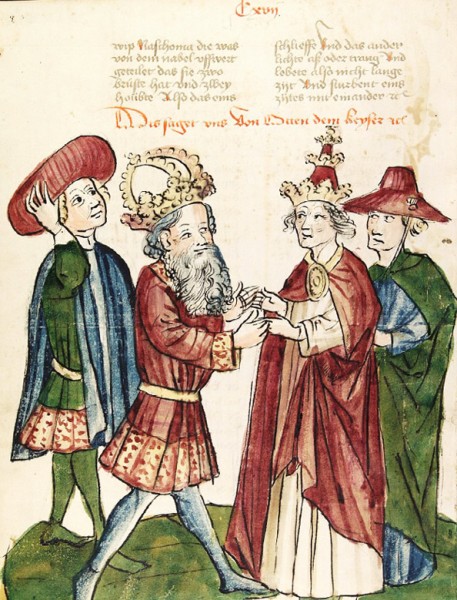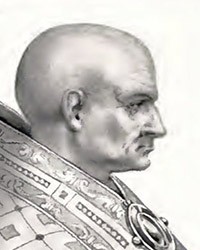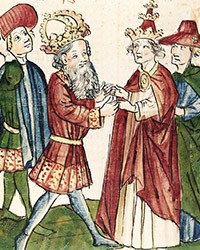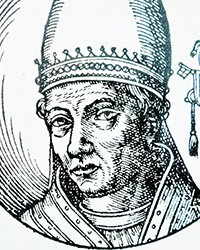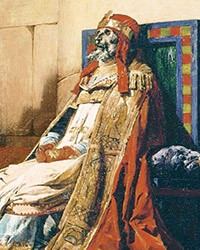Pope John XII (?937–964) – meaning the one who was mortally wounded by the devil in the bed of a married woman
This was reportedly a hammer blow dealt by the unfaithful wife’s husband. Official Church chronicles say a lot less. There we can read that the pope died “due to his promiscuity”. Nevertheless, for all chroniclers it was clear that the pope’s death was punishment for impious life of the vicar of St. Peter, who committed all possible immoral deeds. And there is nobody who would be willing to defend him in the slightest.
This was reportedly a hammer blow dealt by the unfaithful wife’s husband. Official Church chronicles say a lot less. There we can read that the pope died “due to his promiscuity”. Nevertheless, for all chroniclers it was clear that the pope’s death was punishment for impious life of the vicar of St. Peter, who committed all possible immoral deeds. And there is nobody who would be willing to defend him in the slightest.
Our knowledge of John XII comes not only from the filled with propaganda source, namely the chronicles of Liutprand of Cremona – the devoted chronicler of Emperor Otto I (the principal enemy of the pope), but also from Church texts, which also do not show him any mercy (Liber Pontificalis, The Chronicles of monk Benedict of Soracte). It must be admitted that the literature concerning this pope is broad indeed, while his portrait contained within – highly pejorative. Still today it is used by opponents of the Church as an example of unprecedented debauchery of the popes of the X century, while by its supporters as an example of momentary moral downfall, which resulted in centuries-long loss of papal independence on behalf of the emperor. I will however, attempt – after detailing the accusations brought forth against the pope – to tell this story as objectively as possible. We shall see if I succeed.
John XII was to have a weakness for playing dice, which was thought of as highly offensive, and in addition he called upon pagan deities during the game, he took part in hunts, carried weapons, while at night, intoxicated he broke windows, set fire to houses, murdered and wounded his enemies, raised toasts in the honor of Satan, blasphemed and profaned. He bedded the concubine of his own father his father’s sister, as well as his own sisters. He accosted female pilgrims praying in the basilica and forced them to commit immoral deeds, while he turned the palace on the Lateran into a brothel, since he “enjoyed possessing a full collection of ladies”.
He was elected as pope in the year 955. His election was highly controversial, since according to tradition and the law it was impossible to elect a pope while his predecessor still lived. The author of said precedence was the father of John XII, Alberic II – who for nearly a quarter of a century single-handedly ruled Rome, and who prior to his death obliged the spiritual and secular dignitaries to elect as pope (after the death of the current pope, Agapetus II) his son Octavianus. This occurred rather quickly, a mere year later. The newly elected pope, who was not even eighteen years old, took on the name of John XII. He was faced with a difficult task of continuing the policy of his father concentrated on ruling Rome, while at the same time protecting the Patrimony of St. Peter. This last goal was served by wars waged both in the North, where John XII was conflicted with King Beranger II over the Exarchate of Ravenna, as well as in the South – in the area of Capua and Benevento. Unfortunately the conflict with Berengar II turned for the worst. The king plundered the lands of the State of the Church, at the same time trying to free himself from papal jurisdiction. Then John XII recalled another enemy of Berengar II, the then king of Germany, Otto I. When the ruler heard of the pope’s difficulties he knew his moment had come. In exchange for the imperial crown he agreed to offer military aid and free John XII from the problem that was Berengar. The emperor declared himself to be the defender of the Church, while the pope during a truly grand coronation ceremony (962) placed the imperial crown upon his head and the head of his wife Adelaide, at the same time swearing loyalty and devotion. In this way the imperial crown had once again found itself, after many decades, upon the head of a Northerner, who called himself the Holy Roman Emperor. After the coronation a synod was called in St. Peter’s Basilica on the Vatican, during which both the dignitaries agreed that the pope would be elected at the emperor’s consent and with his representatives present, while the ruler would watch over the city in exchange for the recovery of territories by the pope, which in the VIII century had been promised to the State of the Church, by the successor of Charlemagne, Pepin the Short. We have no information whether the immoral conduct of the pope was a subject of the talks or not. The newly elected emperor had no desire for conflicts and even if he had heard some rumors, they were not exposed. Few months later, the pope had changed his tactics. We can only assume, that the Roman aristocrats did not like being subordinate to Otto I and thus losing their power in Rome, while John XII had to be aware of the predicament in which he had found himself. In swearing loyalty to the emperor, he gave up his own power, which until that time he had as the lord of the city and the head of the Church. Otto I found many supporters in Rome, but also numerous enemies, and as soon as he left the city, the pope began negotiations with the man who had previously been his enemy, Berengar and his son Adalbert. It was then that the well-known to us chronicler as well as diplomat, Liutprand of Cremona came to Rome, with the task of finding out the mood prevalent in the city on the Tiber. He returned to Otto I confirming the pope’s insubordination and his political maneuvers, which would threaten the emperor’s position not only in Italy but also in his own kingdom. He also brought back something significant - a virtual plethora of rumors and insults on the topic of John XII. And it was based on these that Otto I formulated (Otto I was illiterate) a letter to the pope, worded as follows: “Both the clergy as well as the lay faithful accuse Your Holiness of murder, perjury, sacrilege, incest with relatives, including two sisters, and of calling upon, similarly as pagans do, Jupiter, Venus and other demons.” In response, the pope deemed these accusations as “rumors repeated by promiscuous bishops” and accused Otto I of perjury due to not returning all the lands subject to the pope. What did Otto I do in this situation? In autumn of 963, after a brief siege of Rome, he entered the city at the head of his armies (since the gates were opened by factions supporting the emperor). The pope along with Adalbert fled the city. Otto I once again called a synod in St. Peter’s Basilica (December 963) with the aim of dethroning John XII. We have no other information on the subject, other than that which came from under the pen of Liutprand of Cremona. He informs us that the pope was accused of (apart from the aforementioned sins) among others, ordaining a ten-year-old deacon in a stable as the bishop of Todi, simony, “diabolical romantic flirts”, neglecting the sign of the cross, lack of respect for the schedule of cannon prayer, as well as blinding, banishing and murdering one of the cardinals. The emperor proposed removing John XII from office and electing a secular person in his place (Leo VIII), which did in fact occur. When Otto I, once again left Rome, the city erupted. At the initiative of John XII, there were fights between the emperor’s adversaries and his supporters. In February of 964, Leo VIII lost his office, while Pope John XII entered the city. Those cardinals who were guilty of his dismissal were punished by having their nose, hands and tongue cut off, then they were called, as well as those who were faithful to him to a synod. Its task was to invalidate all decrees and decisions previously made. The only thing that was left to the pope was wait for the return of the emperor and once again face this significant ruler. Fortunately for him, John XII did not live long enough for this to happen as he died several months later. And here once again Liutprand of Cremona claims that the pope had died because of stroke, in another man’s bed, while having sex with a married woman, and such a version would be repeated for centuries by subsequent chroniclers, who would appropriately exaggerate it. He lived in the same way as he died – that is what all his enemies could conclude. In the official catalogue of popes, the Liber Pontificalis we can read that, John XII “had lived all his life in adultery and vain”.
We may ask ourselves why such great contempt for John XII, and on top of that coming from the very heart of the Church. The ranks of his critics were made up not only of his direct enemies, who could not forgive him the betrayal of Emperor Otto I (Liutprand of Cremona), but also those who accused him of brining Otto to Italy and to Rome. There were also those (Benedict of Soracte), who had desired a renewal of the spiritual life of the Church. Let us not forget that the papal court did no differ greatly from secular ones. Adultery, bribes, simony, and perfidy were common both with the predecessors of John XII, as well as his successors. That is why monks, who came from the French town of Cluny, whom Alberic II (the father John XII) gifted with lands in Italy, began a new movement in Europe (France, England, Italy), known as the Cluniac Reforms. John XII himself actively supported it, which can be testified to by the fact that in Rome itself the monasteries accepted the monastic reform (rule of St. Benedict). Its propagators stigmatized papal habits – simony, nepotism and secularization of all habits. A longing for celibacy returned once again, which would put a stop to the sexual excesses of St. Peter’s successors as well as church dignitaries. John XII became therefore a black sheep, who would be worthy of stigmatization, an example of an utter downfall, which required a decisive reaction.

